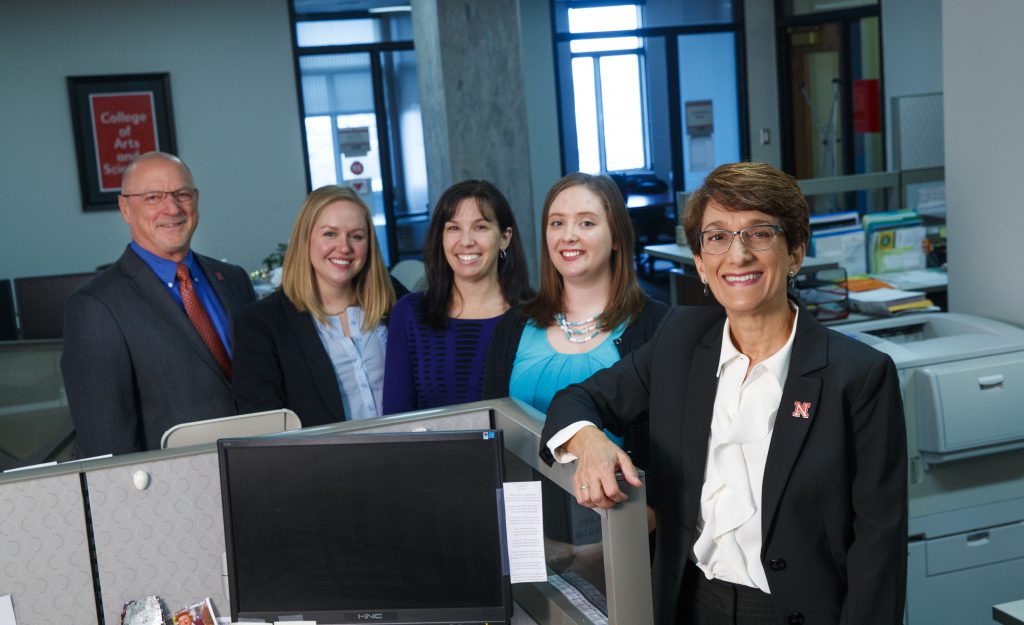Ashley Washburn, December 13, 2016
$15 million project aims to improve child welfare workforce nationally
High staff turnover and other workforce challenges plague child welfare agencies. Ultimately, that can hurt kids and families who need help. The University of Nebraska-Lincoln is leading a $15 million research effort to strengthen the nation’s child welfare agency workforce and improve children’s lives.
The university is launching the Quality Improvement Center for Workforce Development with a grant from the U.S. Department of Health and Human Services Administration for Children and Families-Children’s Bureau. Nebraska’s Center on Children, Families and the Law will receive the $15 million grant over five years.
“We are proud that our Center on Children, Families and the Law has been tapped to lead this research effort aimed at helping public child welfare staffers better cope with job stress,” said Steve Goddard, interim vice chancellor for research and economic development at Nebraska. “The center’s role in this project is an indicator of the university’s research strengths in child welfare. This grant will enable project director Michelle Graef and her colleagues to help our nation’s child welfare agencies carry out their mission of protecting children to their utmost capability.”
This multidisciplinary project will study and test promising strategies for recruiting and retaining child welfare workers. Nebraska will collaborate with three national child welfare consultants and researchers at the University of Colorado, Denver; University of Louisville and the University of Tennessee, Knoxville.
“There are many child welfare agencies across the country that are struggling with how to best recruit and retain their staff. It’s important for any organization, but it’s particularly important in child welfare because the stakes are so high,” said Michelle Graef, research associate professor at the Center on Children, Families and the Law.
Public child welfare agencies are tasked with protecting children from neglect and abuse and strengthening families who need assistance. That sometimes involves removing children from their homes. The work can be emotionally taxing and complex. Resources often are limited and public scrutiny can be intense. The difficult conditions and low pay lead to burnout.
The national turnover rate for child welfare jobs averages 20 percent but approaches 50 percent in some agencies, Graef said.
“Imagine half of your staff leaving every year,” she said. “That poses many problems. Nationally, for many years, it’s been an urgent issue.”
Other potential workforce issues include insufficient supervision and difficulties in attracting and hiring good staff.
Workforce problems hamper an agency’s ability to effectively serve families and children, Graef said. The relationship between workers and families – crucial to positive outcomes – becomes harder to establish, which can mean problems are missed or help is delayed.
To find solutions, the center will select up to 10 tribal and state child welfare agencies located in rural and urban areas nationwide with a range of workforce issues. Consulting teams will be on site to assess issues, develop solutions and work with the agencies to implement and test them for effectiveness. Results will be shared nationally through a variety of outlets.
The center will draw on a range of expertise, including social work, industrial organizational psychology, human resource management, educational psychology, implementation science and the law. The multidisciplinary approach will bring fresh perspectives, Graef said.
Nebraska is uniquely qualified to lead the project, she added. She and others at the Center on Children, Families and the Law specialize in research on workforce issues, focusing on child welfare.
“Our project team has expertise in a variety of disciplines, and we approach problems in a multidisciplinary way,” she said. “We’re thrilled to be selected by the Children’s Bureau for this exciting opportunity.”






